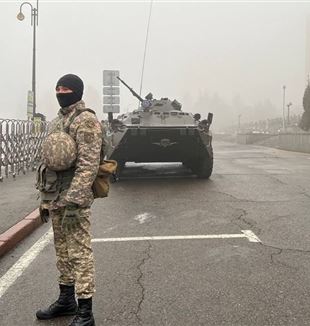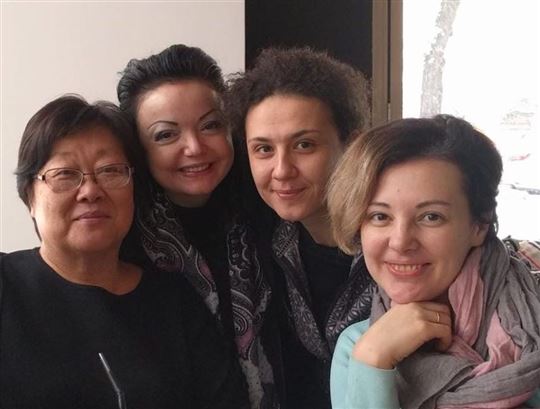
Kazakhstan: Where does war end?
In some cities across the country, the year began with street protests, explosions and casualties. Now the conflict in Ukraine has also come close. From the May issue of Tracce, Lyubov, head of a Center for the Disabled in Karaganda, speaks of her hope."When I listened to Putin's speech, one word resounded within me: 'Impossible! It cannot be...." But I realized that all of this is possible because war often passes through our own loves, through mine. It starts there." Lyubov Khon, 64 years-old, is one of the CL responsibles in Kazakhstan living in Karaganda, a city with half-million inhabitants in the heart of a country that is the size of Western Europe, and which experienced two dramatic weeks earlier this year with street protests, explosions, and casualties (more than 200 dead, thousands injured and arrested). The triggering cause was rising prices, gas and bread. But the anger, arguably, dug deeper. The streets of Almaty, the former capital, saw bloodshed and armored vehicles for the first time in years and scenes that, at least in part, anticipated those now coming from Ukraine. And Lyubov, a former teacher and now head of a center for disabled children called Mayak, "The Lighthouse," stood with her friends before a new tragedy, which touched them very closely. "For us it is immensely painful. For various reasons, all the peoples who lives in the former USSR lived mixed together in Kazakhstan. Many Ukrainians live here and have relatives there. But the pain is multiplied tenfold because so many loved ones, for example some of my former students, my sister and her family, live in Russia."
What do people there say about the war?
It is talked about, a lot, sometimes with only one aim: to find one's stance and defend it at all costs. Such debates are sad. It is evident to me that war ends where the heart opens to the search for truth. Only then can you look at the other not as an enemy, but as a brother.
Have you seen any examples in recent weeks?
A friend came to work on the first day of the war suffering greatly for her sister who lives in Ukraine; and she had a bitter argument with a colleague who was justifying the Russian invasion. That evening we said the rosary together with friends. The next day, my friend came to work and hugged that colleague, without saying a word. Another fact that struck me was to see, also during the first days of the war, how another colleague and a Protestant friend – who has got to know the experience of the movement through me – were living the situation. They were crying all the time, and it seemed to me that the spark of life had gone out in them. Little by little, however, they realized that they needed a way out of that state. One of them decided to participate in our community prayer, the other – unexpectedly – accepted an invitation to a meeting with the mothers of disabled children and the bishop. The first friend then hugged me, "How wonderful it is that you are in my life, I began to breathe." The second friend, coming out of the meeting, had hope in her heart not only for our kids at the Center, but first of all for herself. This was evident in her eyes and smile.
And what is provoking all this in you?
I have encountered something in life that allows me to look at everything without fear. After the initial shock, you resume a path. I need time for my memory to begin working again, for Jesus to become incarnate and to come to me again and give me words of life. It is not always automatic. War often begins within us.
What does that mean?
Someone very close to me is having a difficult time with his wife, who has betrayed him. He is experiencing a war full of animosity, hatred, abandonment.... During this time, I myself have honestly reviewed my relationship with my husband, which for almost a month has been plagued by rejections and demands. I realized that I was living with a cold and hard heart. War often begins within me. And I realized that it was my free choice to live as if at war or to live without losing my life. I felt such poverty, such sorrow for myself, for those near and far, and such a need for Jesus, that for the first time in my life, crying, I said the rosary in the silence of the morning. In that moment, I stood before Christ with my need. I asked Him to defeat the war that had broken out within me. So what is happening in Ukraine entered my heart. I asked for Jesus to become flesh in my life because being aware that He does not leave me helps me to look at what is happening. I was reminded of what Julián Carrón has often reiterated to us about Giussani: "The great problem of the world today is no longer an interrogative theorization, but an existential question. Not: ‘Who is right? But: ‘How is it possible to live?” And this is where my responsibility begins: I have freely received hope to share it with others. It is a first step of awareness that originates in our personal work on the School of Community. And it amazes me how To Give One’s Life For The Work of Another has within it all the answers to my pain, which ceases being an obstacle and becomes a companionship on the journey, an opportunity to get to the bottom of what I have encountered.
What is decisive for you in this situation?
This heart of mine that cries out. It needs to make sense of it all. And the answers I hear from all around me are not enough; they are like background noise. The first help is that freedom and necessity set my memory and reason in motion. Then, the community helps me: for example, Pope Francis with his pain and his sharing in the pain of others and of the Church; Carrón, who in 2014, during a meeting in St. Petersburg which discussed Ukraine, already made enlightening judgments, and these words of Fr. Giussani on Iraq, in 2003: "Salvation is given by following Christ, by identification with His feeling about man and invoking the grace that man may do with his freedom what Christ did with His: abandon his own mortal weakness in the hands of the mercy of the Father.” But the testimonies of friends from Ukraine are also very helpful.
During these past months you too have experienced a very difficult time. What did you learn during those days of unrest?
I discovered an urgent need for truth and reasonable faith. I feel free in our companionship precisely because it is a place of truth. It is not easy for us here; for so many years we have hidden behind ideological strategies. It was easier to entrench ourselves in silence, in a kind of self-deception or passive indifference. In this place, however, I can ask questions, take risks and raise the most uncomfortable issues. On January 12, before the end of the state of emergency, we resumed classes at our Center. It was a great joy for children and parents. That same evening I sent a photo to a friend in Italy. He replied that our Center is a sign that God wants to embrace the whole of Kazakhstan. When I read it, I thought they were exaggerating, at that time the situation was still too difficult.... But after some time, re-reading Generating Traces in the History of the World, it became clear to me that there is no position that corresponds to me more than Giussani's. The paragraph "Educating in social life" helped me understand my friend's words about the youth center: our work, which serves to meet the needs of the person, is characterized by the awareness of the value that a person has for everyone. "Through work reality is transformed and shaped by man (...) we start from the human friendship that is established among those who gather together in the name of Christ, and is called the Church.” Only His mercy gives birth to life. Everything else is war and pain.
Read also – Grossman: “Violence always destroys homes”
You have written to several friends saying, "I am sure that what we are experiencing now is a great opportunity for all of us to regain an open, free and determined stance on what we have encountered." Why? What gives you this certainty?
My heart, my journey over these years, my experience. I am not convinced by words but by what manifests itself and becomes clear in experience. I hunger only for "words" that lift my eyes up from the ground; it is that voice that can tell me that I belong to the One who always gives me confidence, because He has such an all-encompassing love for me that overcomes and embraces my frailty. Only before Him can I kneel with all my thirst to be loved in this crazy world. I have noticed something: during the day I forget to pray, I forget that there is a war going on, I forget the pain... I forget Him. But why do I notice this? Because God does not stop coming to me, and knocking again, "Wake up, look around, open your eyes – I am here." The journey I am on in the companionship of certain friends awakens me and heals me from unconsciousness. As does seeing the need everyone has for that Someone which I have met gratuitously. I posted a picture of Fr. Giussani on social media: "This is my great friend, meeting him changed my life." In the comments, a Lighthouse mom wrote, "Thanks to you I learned to read things on another level." And I replied: "Without this encounter there would be no deeper reading or our Lighthouse." A few days later we saw each other. And the first thing she said to me was, "You have to tell me who Fr. Giussani is. I want to know everything about him."